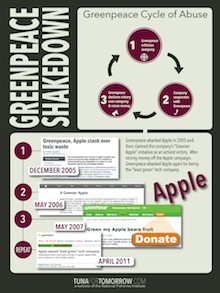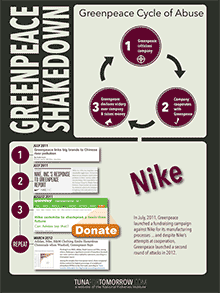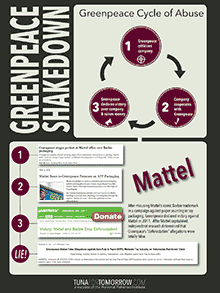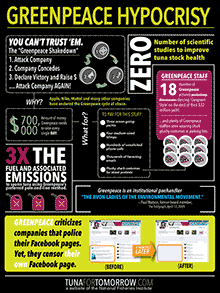via IntraFish
It would be easy to dismiss IntraFishŌĆÖs take on GreenpeaceŌĆÖs campaign against canned tuna as merely an opinion, everyone is entitled to one. That particular opinion ultimately suggests the marginalized activist group is likely to ŌĆ£permanently changeŌĆØ how tuna is harvested and sold (Another Win For┬ĀGreenpeace, March 7, 2012).
But rather than take the easy way, perhaps it is more appropriate to ask IntraFish to actually investigate the very real and negative impact GreenpeaceŌĆÖs demands would have on American familiesŌĆÖ diets if they ever came to fruition, while probing the groupŌĆÖs goals for ulterior motives and unintended consequences.
IntraFish quotes hyperbolic Greenpeace campaigners lauding retailers, who are bullied into submission, as ŌĆ£progressive, comprehensive and visionaryŌĆØ but does not do the homework that would expose a campaign that is short on facts and long on fundraising.
In between begging for contributions, Greenpeace demands the adoption of ŌĆ£sustainable fishing methods.ŌĆØ┬ĀBut to be truly sustainable such methods would need to meet global demand for tuna without endangering the health of tuna populations for future generations.
And the fact is no one fishing method is able to achieve this crucial goal by itself.┬Ā But taken together ŌĆō purse seine netting, Fish Aggregating Devices (FADs), pole and line and other methods are able to sustainably deliver nutritious tuna to millions f consumers around the world.
Greenpeace rails against the use of FADs while extolling the irtue of pole and line fisheries.┬Ā But left unquestioned is whether GreenpeaceŌĆÖs favorite catch method has any drawbacks of its own.
ItŌĆÖs hard to imagine how many individual fishermen would be needed to catch the 50 million cases of tuna each year that supply the United States alone.
The global tuna fishing fleet would have to expand at an exponential rate and that would have consequences that Greenpeace doesnŌĆÖt like to discuss.
For example, the International Seafood Sustainability Foundation (ISSF) estimates that pole and line fishing vessels burn 1,070 liters of fuel for every ton of tuna caught, while purse seiners burn only 368
liters to catch the same amount.┬Ā Never mind that pole and line fishing would quickly exhaust global bait supplies and put undue pressure on juvenile tunas.
Greenpeace also likes to talk about ŌĆ£bycatch.ŌĆØ Catching such a highly migratory fish as tuna in an ocean as large as the Pacific would seem to be an impossible task without snagging something else in the nets, too.┬Ā Yet purse seiners have combined years of experience with scientific insight to develop an approach that catches tuna nearly 95 percent of the time.
The use of FADs is what made dolphin safe tuna a reality ŌĆō so thereŌĆÖs more than a touch of irony in promoting an opinion that considers the elimination of FADs the most significant change in tuna fishing practices since the adoption of dolphin protection standards.
And while Greenpeace tells its followers that charismatic sea turtles are among the bycatch, what they donŌĆÖt tell you is that the total number of sea turtles caught in nets set with FADs is small.┬Ā In 2009, only nine sea turtle were caught in the entire eastern Pacific Ocean.
You canŌĆÖt eliminate bycatch, only reduce it.┬Ā And the tuna fishing community is continually making improvements based on sound science, not sound and fury.
Seafood buyers need to know there are a slew of unasked questions whose answers expose GreenpeaceŌĆÖs tuna campaign as a charade. But such exposition is not a seafood buyerŌĆÖs job. ItŌĆÖs the Fourth EstatesŌĆÖ job.
Greenpeace is like an alarm bell that never stops ringing.┬Ā While most people have tuned out GreenpeaceŌĆÖs
shrill warnings after 40 years, some exasperated retailers have given in to Greenpeace in the hope of making the alarm stop.
Unfortunately, surrendering to Greenpeace only encourages them to come back for more.┬Ā Just ask Mattel,
Bolton or Costco.┬Ā┬Ā Immediately following a very public pressure campaign directed at Costco, Greenpeace was quoted saying ŌĆ£ŌĆ” this is a victory for oceans but Costco could go further.ŌĆØ
Rather than parroting GreenpeaceŌĆÖs hyperbole and rhetoric on its opinion pages perhaps itŌĆÖs time Intrafish devoted some ink to asking hard questions of Greenpeace rather than celebrating its supposed wins.
Gavin Gibbons
Director, Media Relations
National Fisheries Institute








